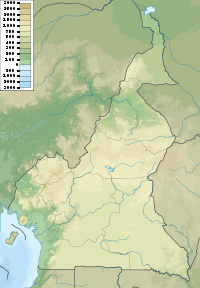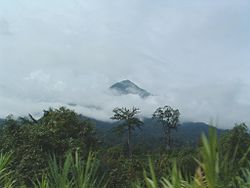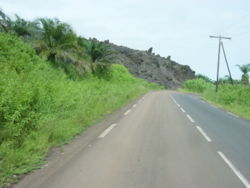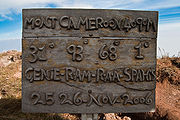
Mount Cameroon
Did you know...
SOS Children have produced a selection of wikipedia articles for schools since 2005. See http://www.soschildren.org/sponsor-a-child to find out about child sponsorship.
| Mount Cameroon | |
|---|---|
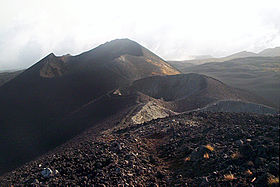 Craters left after the eruptions in 2000 |
|
| Elevation | 4,040 m (13,255 ft) |
| Prominence | 3,096 m (10,157 ft) Ranked 31st |
| Listing | Country high point Ultra |
| Location | |
|
Southwest Province, |
|
| Coordinates | 4°13′00″N 9°10′21″E Coordinates: 4°13′00″N 9°10′21″E{{#coordinates:}}: cannot have more than one primary tag per page |
| Geology | |
| Type | Stratovolcano |
| Last eruption | 2000 |
| Climbing | |
| First ascent | Joseph Merrick, 1840s |
| Easiest route | Scramble |
Mount Cameroon is an active volcano in Cameroon near the Gulf of Guinea. Mount Cameroon is also known as Cameroon Mountain or Fako (the name of the higher of its two peaks) or by its native name Mongo ma Ndemi ("Mountain of Greatness").
The mountain is part of the area of volcanic activity known as the Cameroon Volcanic Line, which also includes Lake Nyos, the site of a disaster in 1986. The most recent eruptions occurred on March 28, 1999 and May 28, 2000.
Description
Mount Cameroon is one of Africa's largest volcanoes, rising to 4,040 metres (13,255 ft) above the coast of west Cameroon. It rises from the coast through tropical rainforest to a bare summit which is cold, windy, and occasionally brushed with snow. The massive steep-sided volcano of dominantly basaltic-to-trachybasaltic composition forms a volcanic horst constructed above a basement of Precambrian metamorphic rocks covered with Cretaceous to Quaternary sediments. More than 100 small cinder cones, often fissure-controlled parallel to the long axis of the massive 1,400 km³ (336 mi³) volcano, occur on the flanks and surrounding lowlands. A large satellitic peak, Etinde (also known as Little Mount Cameroon), is located on the southern flank near the coast. Mount Cameroon has the most frequent eruptions of any West African volcanoes. The first written accounts of volcanic activity could be the one from the Carthaginian Hanno the Navigator, who might have observed the mountain in the 5th century BC. Moderate explosive and effusive eruptions have occurred throughout history from both summit and flank vents. A 1922 eruption on the southwestern flank produced a lava flow that reached the Atlantic coast, and a lava flow from a 1999 south-flank eruption stopped only 200 m (660 ft) from the sea, cutting the coastal highway.
The peak can be reached by hikers, while the annual Mount Cameroon Race of Hope scales the peak in around 4½ hours.
English explorer Mary Kingsley, one of the first Europeans to scale the mountain, recounts her expedition in her 1897 memoir Travels in West Africa.
